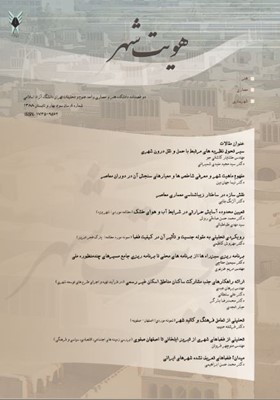ارائه راهکارهای جلب مشـارکت ساکنان مناطق اسکان غیر رسمی (در فرآیند تهیه و اجرای طرح های توسعه شهری)
محورهای موضوعی : معماریبرهان عبدی 1 , علی سلطانی 2 , محمدرضا بذرگر 3 , جبار امجدی 4
1 - کارشناس ارشد شهرسازی دانشگاه شیراز. (مسئول مکاتبات)
2 - استادیار بخش شهرسازی دانشگاه شیراز
3 - استادیار بخش شهرسازی دانشگاه شیراز
4 - کارشناس ارشد روانشناسی دانشگاه شیراز
کلید واژه: Informal settlements, مشارکت, participation, citizen, شهروند, اسکان غیر رسمی, طرح توسعه شهری, urban development plan, ابزارهای انگیزش, motivation tools,
چکیده مقاله :
در پژوهش های مرتبط با برنامه ریزی و طراحی شهری و همچنین طرح های ساماندهی مناطق غیر رسمی، سخن از مشارکت بسیار بکار رفته، با این وجود راه های موثر بر ایجاد انگیزه مشارکت در فرآیند تهیه و اجرای طرح ها هنوز تا حدودی مبهم و ناکافی است. نتیجه آنکه اغلب در کشورهای در حال توسعه، علیرغم مباحث بسیار گسترده در این عرصه؛ مشارکتی شدن طرح ها چندان عملی نشده است و متعاقب آن بسیاری سرمایه های مادی و معنوی بدون بازدهی مناسب در حال هزینه شدن هستند. این مقاله درصدد است با شناخت نسبتا کامل موانع مشارکت در طرح های ساماندهی سکونتگاه های غیر رسمی بر مبنای دیدگاه های مطرح در روانشناسی اجتماعی، روش های مناسب در چارچوب این نظریه ها را مورد بررسی قرار دهد. انتظار می رود با بهره گیری از ابزارهای موثر در جهت ایجاد انگیزه مشارکت که از بنیادی ترین ابعاد اجتماعی توسعه می باشد و متأسفانه کمتر ملحوظ گردیده، راه برای حضور فعال ساکنان در ارتقاء سکونت گاه خود هموار گردد.
New approaches on informal settlements show that there is a reduction in technical and physical aspects as well as increase in environmental, social and human aspects , Gradually and impressed from theoretical perspectives such as enabling and revision on the governments' role in providing housing and services. On this basis, settlements by low-income people is built regarded as a part of the capital city society which must be proceeded to manage and regularize such settlements via participatory planning with emphasis on their participation to understand priorities and practices. Although it has been talked about participation so much in Urban Planning literature and Informal settlements plans; but effective solutions for building motivation of public involvement in process of preparation and implementation of plans are yet ambiguous and insufficient. As a result, most of developing countries are not able to apply participation in their plans; and as a consequence, physical and intellectual capitals are thrown away. This research struggles to identify the obstacles of citizens’ participation in Squatter Settlements upgrading Plans upon psycho-sociological theories and assess suitable solutions in framework of these theories. It is expected that using effective tools for participation motivation building, makes involvement of residents in improvement their settlement possible.
http://www.worldbank.org/afr/poverty/measuring/cross_country_comparing_en.htm.
_||_

